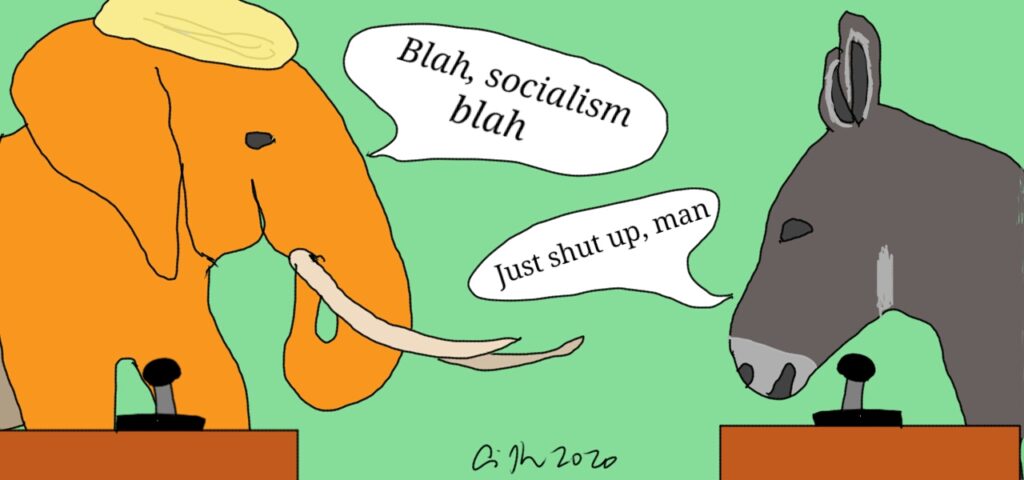by Craig Klugman, Ph.D.
During election years, I usually blog about any health and bioethics-related issues raised during debates between candidates. This week I am not sure what to report from the first Presidential Debate of 2020.
To listen to what the candidates said about health would lead to some odd claims. For example, Mr. Trump said that his opponent wants to take away private health care and establish a government-controlled, socialist system. To listen to Mr. Biden, his opponent wants to wrest health insurance from millions of people in a pandemic and offer them nothing.
Since neither said much about what they really plan, I had to seek any white papers they have put out, statements on their websites, and their history. On September 24, 2020, Mr. Trump signed an executive order for “An American-First Healthcare Plan”. His goal is “bringing great healthcare to the American people and putting patients first”. In this document, Mr. Trump reminds us that he signed a law repealing the insurance mandate (requirement that everyone purchase health insurance); that he signed another executive order that he intended to create short-term, permitted inexpensive (low coverage) health plans, provided states with waivers for required coverage in insurance plans, has cut red tape, decreased drug costs (if intended, this has not happened), allowed vets to seek care outside of the VA system, and signed an emergency experimental drug use waiver for people in the last stages of life. It is important to say, that some of these are not real “accomplishments” (drug prices are actually higher, fewer people have health insurance). In the future, he plans lower costs, increased options, and improved care for veterans. How any of that will be accomplished is not listed here. In recent weeks, Mr. Trump has announced a $200 gift card for seniors to help with their prescriptions, a one-time assist. He also says there will be a COVID vaccine by the election though no public health official or pharmaceutical executive sees that as possible.

In a case before the U.S. Supreme Court, Mr. Trump’s administration has asserted that the Affordable Care Act is illegal because the individual mandate has been removed. Twenty states are suing for the elimination of the ACA. The effect would be that 20 million people would lose their health insurance, children would be cut off of their parent’s insurance at age 18, lifetime caps could be reinstated, and people could be refused coverage or charged extra if they have pre-existing conditions (this alone effects 54-133 million people). The replacement plan lacks specifics other than platitudes.
On the other side, Mr. Biden says he would build on the Affordable Care Act, a bill passed while he served as Vice-President. He calls his plan, “Protect & Build on The Affordable Care Act” that sees health care as a right, not a privilege. His plan would create a public option, meaning that people could choose to purchase a health plan that is more like Medicare than a private health insurance. His plan would provide tax credits to people making 400% of the poverty line to help pay for health insurance; expand Medicaid in the 14 states that did not opt to expand it. This plan would also ensure health insurance coverage for contraception, repealing the Hyde Amendment (that does not permit government funds to pay for abortion and would require an act of Congress), restore funding to Planned Parenthood (another act of Congress), reverse the global gag rule, and guarantee equal access to health care. This is also a list of aspirations, but does include some specific actions that the candidate would take as president.
Both candidates support passing legislation that would lower premiums and eliminate “surprise billing”. This term refers to patients who visit an in-network hospital but do not realize that a consulting physician or their anesthesiologist on call is out-of-network. Not only are these care providers that the patient has not selected, but after their procedures, the patient receives a far higher bill than they expected (since out of network care is reimbursed at a much lower rate). Both campaigns support lowering drug prices including allowing people to buy drugs from other countries. Mr. Trump has met with pharmaceutical manufacturers but has been unsuccessful in his nearly 4 years in office in achieving this objective. Mr. Biden suggests removing the restriction on Medicare from negotiating with pharmaceutical companies, installing price controls on drug prices, and removing a tax deduction for pharmaceutical advertising costs (yes, taxpayers actually foot the bill for those drug ads).
Learning about these different views during the debates would have been informative.